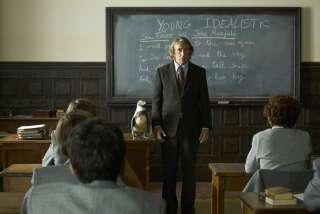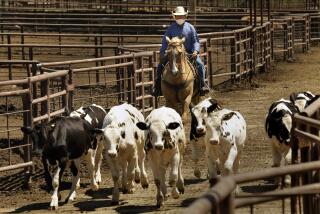T-Bone, the Teacher
- Share via
Daddy, where does our meat come from?
Why, it comes from the supermarket, silly.
Oops, it seems a few school kids just learned otherwise.
T-Bone the steer was slaughtered in the schoolyard the other day. Zapped with a stun gun, bled, gutted, carved into what we call “cuts” and ground into patties on his way to the dinner plate. T-Bone’s skin was stripped off to make, perhaps, seats for a sedan or a dozen pair of brogans.
This happened at a private school in the Orange County city of Brea. T-Bone provided a few with food, but many others with food for thought.
For one, I applaud Tony Barnes, the vice principal at the Carbon Canyon Christian School. His only mistake with this lesson plan was not calling news reporters, radio talk-show hosts, protesters and city officials ahead of time, so that the mini-media circus could have occurred simultaneously with T-Bone’s slaughter and not afterward.
According to news accounts, a dozen “animal rights protesters” objected to this school project. They were quoted as saying it was disgusting. They argued that schools should be teaching kindness toward animals, not bringing on their death.
I have many friends in this movement. I know their hearts are pure. But in this instance, they are wrong. Pandering city officials in Brea are even sillier by putting this school on the defensive and stigmatizing its instructional lesson with talk of an investigation.
Urban Americans have grown removed, I’m afraid, from the sources of our food, and thus from the cycles of nature. Meat does not come from the supermarket. It comes from animals. And not willingly.
Hunters know this. I have many friends who are hunters, too. Hunters, at least those whom I call ethical hunters, and vegan animal rights activists have one thing in common: They live in awareness of animals and their suffering. The rest of us, let’s admit it, occupy a lower moral plane. We hire killers to do the work for us.
Yes, I’m a meat eater, although I eat less than I used to. But I try to keep in mind our favored place in the natural world. I joined the Carbon Canyon students in learning the lessons of real life. I remember what it’s like to shoot a deer as a teenager and watch, shocked, as the light goes out of a creature’s eyes. I think of the roadside barbecue in Central Africa where I ordered lunch. There was not enough meat on the grill, so the proprietor grabbed a rope and pulled forth a squealing goat, slitting its throat before I could change my mind. I cannot forget the sight of Eskimos hunters winching a 100-ton bowhead whale onto the Arctic ice while other whales circled in the nearby water and seemed to grieve.
Seeing animals die has not hardened my heart, but softened it. Animals sustain us. We owe them back. That’s called the cycle of life. It is not a Hollywood cliche when a Native American hunter drops to his knees and prays to the buffalo he has just killed. Every hunter understands the immeasurable pang of loss when an animal is slain. Those of us who shop at the supermarket are removed from the scene, but we are amoral if we also exempt ourselves from the emotion of it.
If I was the parent of a student at Carbon Canyon, I would have signed a permission slip with those 40 other parents. I would have attached a letter of thanks to Barnes. Children should understand where food comes from, not in the abstract but in the visceral. It is far more chilling to think of children gobbling down hamburgers, wholly detached from where the burger came.
In our urban culture, this severing of our connection with the life-and-death of food has given rise to the unspeakable horrors of industrial livestock processing. Those steers and pigs and chickens and lambs die instantly, we are told. We’re supposed to feel better. But their lives have been made brutal and hellish to answer the efficiency of commodity prices. Turning our heads from that diminishes our humanity.
Slaughtering T-Bone didn’t help the children of Carbon Canyon Christian School with their standardized tests. But it opened their eyes to their place in the world. I call that teaching The Basics.


